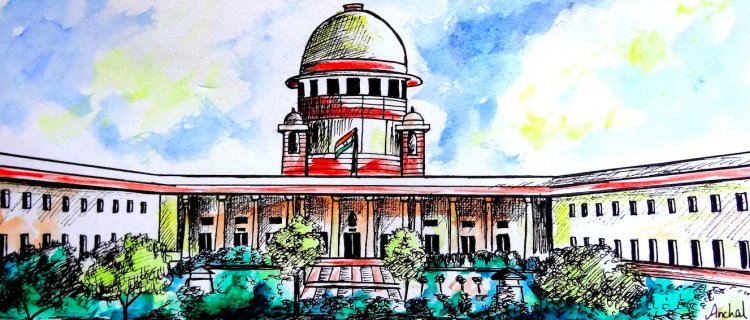Major Court orders On Environmental Matters

There has been a ‘world-wide explosion’ of tribunals and courts focusing on lawsuits involving environmental issues, according to the world’s pre-eminent experts, Professors George (Rock) Pring and Catherine Pring. This development is ‘dramatically changing the playing field for environmental justice around the world’.
Knowing about this development is vitally important to attorneys, legal academics, enterprises, civil society groups and others all around the world since it underscores the need to understand the new-found and important role of environmental courts and tribunals.
Today we bring to you the most recent top environmental cases heard in the Supreme Court, the high courts and the National Green Tribunal.
Bio-medical Waste Management
An oversight committee headed by Justice SVS Rathore filed a report before the National Green Tribunal (NGT) on non-compliance of the provisions of Bio-Medical Waste Management Rules, 2016 (BMW Rules, 2016) by Uttar Pradesh.
The report was in compliance with the NGT order passed in Original Application No. 710 / 2017 in the matter of Shailesh Singh Vs Sheela Hospital and Trauma Centre & Others.
The committee, in its report, said there was an elaborate track and trace system of bio-medical waste management prescribed in the BMW Rules, 2016, in which all coloured bags are bar-coded. The movement of trucks is tracked through a global positioning system (GPS).
However, barring a small pilot in Lucknow, none of the operators were using the bar-coding system. This put a big question mark on the reliability of the data generated, it said.
Large infrastructural gaps in healthcare facilities (HCF) were also noticed, due to which many were not complying with BMW Rules. Around 452 of 530 HCFs with an operating capacity of more than 100 beds did not have sewage treatment plants (STP) / effluent treatment plants (ETP).
Even in government facilities, out of 1,027 HCFs comprising district hospitals and community health centres (CHC), 564 did not have collection sheds where biomedical waste could be collected.
Only 628 primary health centres (PHC) out of 3,620 had deep burial pits.
The construction of ETPs in district hospitals was very slow and only 40 district hospitals were taken up for ETP construction in 2020, it added. Nearly 2,483 HCFs were not authorised under BMW Rules. Of these, 441 HCFs belong to the government.
An important gap was noticed in the disposal of radioactive materials. The health department must develop standard protocols and build capacity for all the stakeholders, the report said.
The report stressed on capacity building among stakeholders. Pollution in hospitals was a constant challenge and the nature and extent of infections keep on varying, the latest being COVID-19.
The report recommended that capacity building workshops be organised on a continuous basis for all stakeholders — doctors, paramedics, other hospital staff, laboratory staff, blood bank staff, private practitioners, nursing homes and the HCFs.
Mining in and Around Jaisamand Lake
The NGT October 6 took up the application filed by Nanga Ram Dangi on illegal mining in the area around Jaisamand Lake, Rajasthan’s Udaipur district.
The application, filed in 2014, alleged illegal mining in eight villages in the catchment area of the lake.
The tribunal considered the matter vide order September 19, 2018, and directed the Directorate of Mining and Geology to ensure that all illegal mining activities in the catchment area of the lake were closed.
It asked the directorate to submit a compliance report to the tribunal. The matter was, thereafter, considered in light of the status reports filed from time to time.
The NGT took up the matter in continuation of the earlier proceedings and also looked at the action taken report September 30, 2020, filed by the Inspector-General Police, Udaipur. The report stated that regular touring was being done in the area using drones.
NGT termed the action taken report as inadequate and lacking in meaningful enforcement of law. The Bench of Justices Adarsh Kumar Goel and SP Wangdi directed the Chief Secretary, Rajasthan, to consider appropriate course of action in light of various orders passed by the tribunal and circulate appropriate guidelines at grass-root level, particularly the district magistrates and superintendents of police.
Electronic surveillance system must be reviewed and include requirement of GPS for the vehicles used in transportation and mined materials. There should be CCTV cameras at the hotspots and a mobile application which could be used by any complainant for giving information about illegal activities of this nature.
Land Encroachment
The NGT October 6 directed the district administration and the Nagar Nigam, Bhopal, to take appropriate action in encroachment of government land and nallah and discharge of untreated sewage at village Kauluva, Bhopal, by Hardesh Kirar.
A joint committee constituted to look into the matter acknowledged encroachment and diversion of the drain.
A new report was filed by the Madhya Pradesh Pollution Control Board (MPPCB) August 7 on behalf of the joint committee. The report said the MPPCB had directed the district administration and Nagar Nigam to take necessary action on nallah encroachment.
The said nallah was then demarcated, so that necessary action could be taken by the district administration and Nagar Nigam, Bhopal.
Housing Project Violations
Serious and repeated violations of environmental norms by housing projects have been reported in Haryana, the Bench of Justices Adarsh Kumar Goel and Sonam Phintso Wangdi of the National Green Tribunal (NGT) said October 5, 2020.
The court was looking at the violation of conditions of Environmental Clearance (EC) and the Water (Prevention and Control of Pollution) Act, 1974, by the housing project Vesta Heights in Faridabad’s Baselwa village.
The Consent to Operate under the Water Act, 1974 had expired in March 2018. The sewage treatment plant was not adequate and overflow was being discharged into the Agra Canal.
The report of the joint committee comprising the Union Ministry of Environment, Forest and Climate Change (MoEF&CC), the Central Pollution Control Board (CPCB) and the Haryana State Pollution Control Board (HSPCB) assessed compensation of Rs 120,280,310.
The NGT expressed its dissatisfaction with the report, saying it did not show adequate action for compliance of environmental norms.
The amount of compensation had not yet been recovered, coercive measures were not taken and the order of blacklisting was not carried out — even when the State Pollution Control Board (PCB) had written to the director, town and country planning department, Haryana — the NGT said in its October 1 order.
The Tribunal directed that a meeting of statutory authorities concerned be held within a month and monitored by the chief secretary, Haryana.
Housing Project Affects River Flow
The NGT October 1 took up the matter of Omaxe Chandigarh Extension Developers Pvt Ltd setting up a residential complex project ‘The Lake’. The project was allegedly obstructing the natural flow of river Sisvan by filling up and closing a part of it in village Bharoujian. It reportedly diverted it to another place in nearby village Kansala in Mohali.
The applicant had showed, through Google photographs, a rivulet in 2003 and a road that had been constructed without making any culvert to maintain the natural flow of the river. This had resulted in flooding.
The report by Punjab acknowledged the violations; the NGT March 3 directed that steps be taken to stop the diversion of the river, filling up of the river and removing illegal constructions. But a report filed by the chief engineer, state Water Resources Department, said there was no obstruction in the natural flow of the river.
This was disputed by the applicant, who said the report did not show compliance with the NGT orders. The statement, saying the flow of the river was not obstructed, was not adequate and was in conflict with the earlier reports referred to in the NGT order March 3, according to the applicant.
It was also pointed out that the matter had been dealt with only by the executive engineer of the Water Resources Department, without involvement of other concerned departments, including Greater Mohali Area Development Authority (GMADA), Housing and Urban Development Department, the Environment Department and the Irrigation Department.
The NGT directed the Chief Secretary, Punjab, to call a meeting of the departments concerned: the GMADA, the Housing and Urban Development Department, the Irrigation Department and the Environment Department within one month to look into the matter. It directed the authorities to take remedial action and furnish a report within three months.
Oil spill at Chandrapura Thermal Power Station
The committee constituted to look into the oil leakage at Chandrapura Thermal Power Station (CTPS) in Jharkhand’s Chandrapura submitted its report to the NGT September 29. The team was to assess the extent of oil leakage and assessment of environmental damage caused by the oil spill.
The leakage occurred on October 15, 2019, when the oil was being unloaded at CTPS site. The connecting pipe developed a crack, causing the leak. It engrossed into the nearby drainage system constructed to collect storm water and drained into river Damodar.
The spilled oil was collected from the drainage channel and river and stored in oil drums. Fly ash was also used to soak spilled oil to control spillage of oil.
The committee visited the affected areas and said there was hardly any sign of released hydrocarbon. It added there was no sign of environmental damages to the nearby agricultural field either.
The report stated that fuel oil was considered to be less toxic and the long-term effects needed an extended in-depth study.
Access to justice, particularly, in matters relating to environment, is an essential facet of Article 21 of the Constitution of India. It can’t be forced enough for the need of such court orders in these critical, urgent environmental matters which affects millions of people in India, directly or indirectly.















































